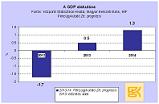| Contact |  |
 |
You are here
Home ›Creating Competition by Bargaining. Demonopolisation and State Aid during Transition
State redistribution maintaining a soft budget constraint and a centralised organisational system for companies were some of the essential characteristics of the centrally planned economy. Transition may have been expected to strengthen competition alongside private ownership. The large companies, created artificially at an earlier period, should have split up and redistribution diminished as a distortion of competition. In contrast to this, everyday life at the turn of the millennium in this country echoes with the news of monopolistic tricks and large mergers. We are also informed of redistribution plans and schemes outbidding each other, not to mention the promises of European Union subsidies.
Have the structural foundations for competition really remained weak in Hungary? What kind of economic and social interests are preserving subsidies as a narcotic, and what sort of forces are causing the cyclical nature of redistribution? Can competitiveness be strengthened in the long run at the expense of competition? Besides the theoretical framework and analyses of socio-economic dilemmas, this book offers the Reader a colourful palette of government decisions and actual company cases. It assembles the mosaics of successes and encoded failures by using personal conversations and articles from the daily press, considered to be an archive of contemporary history.
Akadémia Publishing House 2003
| Attachment | Size |
|---|---|
| 78.59 KB |
Financial Research Plc.
IKU Innovation Research Centre
News and events
Working Paper Series
-
11/26/2011 - 15:38
-
11/25/2011 - 16:00
-
11/18/2011 - 20:00
-
08/20/2011 - 15:31
-
07/18/2011 - 19:53



